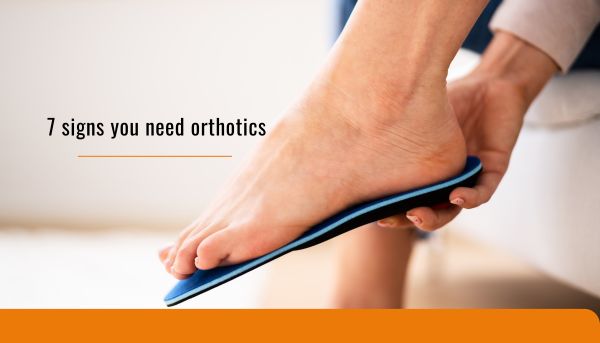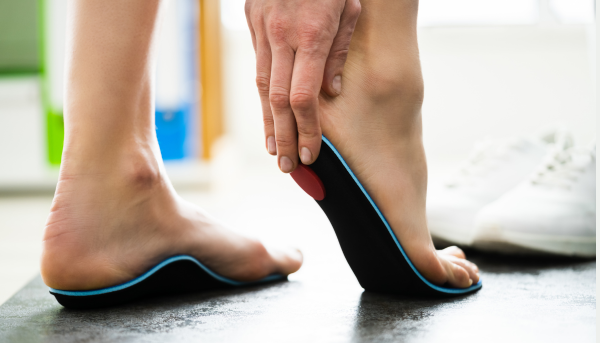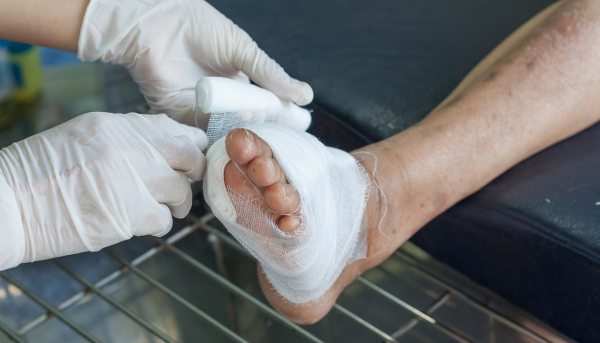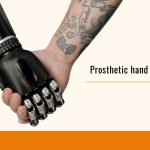
Do your feet feel tired after a short walk? Or do you constantly wonder, “Is it normal for my knees or back to ache like this?”
If so, the real question might be—“Do I need orthotics?” Many people don’t recognise the early signs that they need arch support.
This blog breaks down seven signs you shouldn’t ignore, from foot fatigue to posture problems. Your feet carry you through life—let’s make sure they’re properly supported.
Do I need orthotics? 7 signs you need arch support
Orthotics are custom shoe inserts designed to support and align the foot properly, helping reduce pain in the feet, knees, hips, and back.
Sign 1: You have foot pain or swelling
If you regularly experience foot pain or swelling without any recent injury or known cause, your foot mechanics may be to blame. Poor arch support, overpronation, or flat feet can lead to strain in the ligaments and muscles of the foot, which can, over time, cause inflammation and persistent discomfort.
Orthotics for foot pain are designed to improve alignment and distribute pressure more evenly, which can significantly reduce pain and swelling.
If your foot discomfort gets worse with activity or at the end of the day, orthotics foot pain may provide the relief you need.
Sign 2: You have sharp heel pain
Do you feel a stabbing pain in your heel, especially during your first few steps in the morning or after sitting for a while?
This could be a sign of plantar fasciitis, one of the most common causes of heel pain. It occurs when the band of tissue that connects your heel to your toes gets irritated or inflamed.
Orthotics for heel pain help by providing cushioning, arch support, and better foot positioning to ease pressure on the plantar fascia. They are often a key part of treatment and can help prevent the condition from recurring.
Sign 3: You have a flat foot or high arch
Structural abnormalities such as flat feet or high arches affect how your body distributes weight and absorbs shock during movement.
Flat feet can cause overpronation (rolling in of the foot), leading to stress on the ankles, knees, and hips. On the other hand, high arches offer poor shock absorption, which can result in foot pain, instability, or frequent ankle sprains.
These are some of the clearest signs you need arch support. Orthotics designed specifically for your foot type can help restore balance, reduce pain, and prevent further complications like tendonitis or shin splints.

Sign 4: You’re having problems with balance
Feeling unsteady on your feet or experiencing frequent stumbles may indicate that your feet aren’t offering enough support.
Your feet are essential for maintaining balance and alignment throughout your entire body. Biomechanical issues such as misaligned joints, flat arches, or uneven pressure distribution can impact your stability.
Custom orthotics can correct these issues by aligning your feet properly, improving posture, and enhancing coordination. This is especially important for older adults or anyone recovering from injury who wants to prevent falls and maintain mobility.
Sign 5: Your shoes are wearing unevenly
Have you noticed that the soles of your shoes wear down more on one side than the other? This is a telltale sign of abnormal gait or foot posture.
Uneven wear typically suggests that your feet are not striking the ground properly, leading to pain in the feet, ankles, knees, and even hips or lower back. This wear pattern is one of the more visible signs you need orthotics.
A custom orthotic can help correct your gait and ensure even weight distribution across your feet, making each step more efficient and less painful.
Sign 6: You have a lower limb injury
Frequent leg pain, shin splints, knee discomfort, or even hip pain can stem from poor foot alignment.
When your feet don’t move as they should, it creates a ripple effect up your legs. Athletes, runners, and people who stand or walk a lot are especially vulnerable to these issues.
If you’ve suffered a lower limb injury or experience recurring leg pain without a clear cause, foot pain orthotics can reduce the load on overworked muscles and joints, speeding up recovery and preventing re-injury.
Sign 7: You have diabetic foot complications
People living with diabetes often face unique foot challenges due to poor circulation and nerve damage (neuropathy). These complications can lead to loss of sensation, making it difficult to notice wounds, ulcers, or pressure points.
Orthotics for diabetic foot care help protect sensitive areas of the foot, reduce pressure, and prevent injuries that could become serious.
If you have diabetes and notice any foot pain, numbness, or skin changes, you should speak to a specialist about custom orthotics as part of your foot care plan.

Visit Xtremity for orthotics in Dubai
At Xtremity, we specialise in diagnosing and treating foot conditions with advanced, custom-made orthotics for foot pain and support.
Whether you have a flat foot or high arch or are recovering from a lower limb injury, our expert team will assess your gait, posture, and pressure points to create orthotics that perfectly fit your needs. From managing diabetic foot complications to providing signs you need arch support solutions, we offer a holistic and patient-centric approach to foot health.
Take the first step toward pain-free movement—book your orthotics consultation at Xtermity today.
About Us
Xtremity Prosthetics and Orthotics is a specialized health clinic where treatment is provided by a specialized team which comprises allied health professionals as well as medical professionals giving a multidisciplinary approach towards prosthetic and orthotic rehabilitation care.



